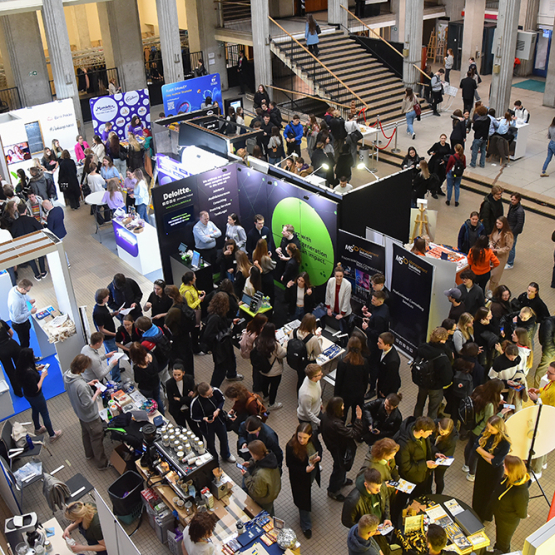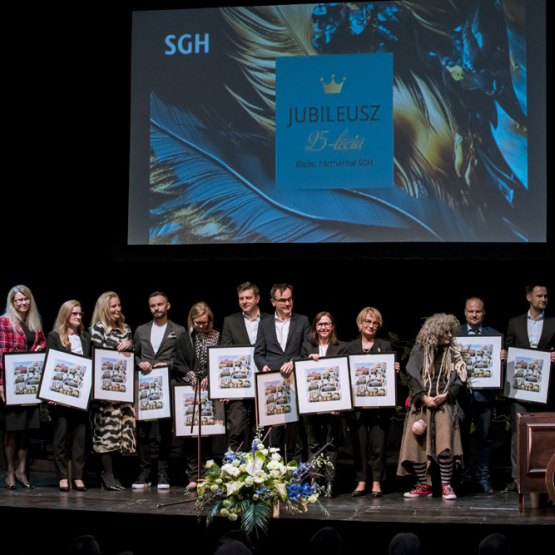Moving on from words to deeds – Samsung becomes member of SGH Partners Club

Lidia Jastrzębska interviews Tomasz Chomicki, Dawid Wrona and Prof. Krzysztof Kozłowski on cooperation of SGH Warsaw School of Economics with business.
When did the SGH cooperation with Samsung begin?
Tomasz Chomicki: Over two years ago. A joint initiative of the SGH and Samsung Electronics Polska was launched in April 2018. The first classes were held within the framework of the pilot programme titled: “SGH – Samsung Workshops – challenges in governing the international technological corporation.” During the training, the Samsung employees shared their experiences and good practices, which they use in the business environment on daily basis. It has to be noted that those classes were included in the programme assessed according to the ECTS classification, i.e., were encoded into the network of the obligatory curriculum, which raised their rank and intensified the students’ involvement. The recruitment for the course was carried out by the university while our task was presentation of the materials and ideas which were assessed by specialists in the area of didactics. Workshops were attended by 16 students, and 20 Samsung experts shared their knowledge with them. Workshops were divided into two topical blocks: technological and socio-business one. We had chosen the workshops formula. The first part, made students acquainted with functioning of a technological company and future challenges connected with innovations. The second topical module focused on good practices in the area of functioning of the organisation from communication up to management of finances, as well as on the programme of the social responsibility and the sale of solutions to B2B customers. The fulfilment of the programme was personally coordinated and supported by the University Chancellor, Professor Krzysztof Kozlowski. For the subject to be approved, a student had to develop projects which were assessed together with lecturers.
It was a fruitful beginning of the cooperation, what was the successive stage?
Tomasz Chomicki: The successive one was the initiation of a formal cooperation within the framework of the SGH Partners Club. It was in November of 2018, which was followed by large scale activities. One of them was the Samsung Day, prepared in April that year by our HR Samsung Department and the SGH Centre for Corporate Relations.
Last term, we also launched a new didactic project within the framework of the design thinking classes conducted in a non-standard formula by Professor Rafał Kasprzak with an international group of CEMS students. The participants of the project included Samsung business and technology experts and representatives of the Echo Investment company, one of the largest Polish construction developers, and at the same time, one of our business partners.
Within the course of classes, we were presenting the solutions in domestic facilities products area. It is a new group of devices included recently into the Samsung Polska portfolio, to be used in households.
Dawid Wrona: Our Company is closely monitoring what consumer changes are occurring in the Polish and global markets, what is our target group, i.e., people 30-40 years of age are paying attention to, what they are using in their everyday lives. In this context, our residential areas have nowadays smart home symptoms, each of our apartments is equipped with IT devices, and in common spaces we add functions or devices, which provide better living. We call it live service, and they include, for instance, such services as parcel lockers, car sharing, electric chargers. In cooperation with Samsung and SGH, we were discussing it in connection with our key project, i.e., Browary Warszawskie (Warsaw Breweries). We were thinking how young people perceive our projects, how they would like to design the common space, considering such a technology. That is how the idea of this project emerged, and that is how it was carried out.
Tomasz Chomicki: In the course of the classes, we presented the practical use of innovation solutions. The training ended with the preparation of works which combined the IT technology/consumer electronics with the household ecosystem. There is a chance that some of the ideas will be implemented as pilot solutions in the products of the household industry. It was a unique educational and business project for us and a pioneer solution which we are testing now. It is an inspiration for our further activities in searching for and discovering innovations.
Contrary to our foregoing projects, this initiative was carried out with the participation of international students’ community. In this context, our experiments did not concern exclusively local Polish market but also included expectations of young people who look at their needs from the perspective of their birthplace, educations, growing up and studies at foreign scientific institution. It allowed us to go during the classes beyond the “comfort zone” and to tackle the “global” perspective. We would like such projects to be continued since they provide all of us with new experiences and the capability to create something which is practically usable. I think that for each organisation it is a new added value.
How many so inspiring students’ projects have been launched and which of them have a chance to be implemented?
Dawid Wrona: We were satisfied with several projects, we have some favourites, and we see that their projects are compatible with market demands and our analysis indicating the things the customers are concerned with. In cooperation with the SGH and Samsung, we are implementing new interesting education and business projects. We would certainly like to include the participants of these projects into further process of implementation of their solutions in the way that would enable our company to introduce novelty while students would be able to learn more in the process since the idea of these workshops is combining theory with practice.
Why do you underline the aspect of the participation of international students in workshops?
Tomasz Chomicki: Participation in this kind of a project fosters the expansion of horizons and acquisition of new experiences which may become fruitful in a new work environment. Studies concerning professions of the future conducted by EY Company show that one of the key abilities worthwhile developing is the ability to work in a global model. Global economy and universality of communication services have enforced so far new employees to adopt a new style, communication skills and abilities of business management and design. I think that each party of the project was able to convey their own expertise and competencies. In Samsung, we have many global projects, however, each meeting with a young man is important since it always reveals to us a new perspective as perceived by a customer, a partner. Superposing the map of open notions from all over the world on that experience, we have a chance to discover something new which perhaps will turn out to feasible for implementation in the Polish market.
Dawid Wrona: The international character of the workshops is so significant since neither Poland nor Europe are determinants of the latest trends in technology, and therefore, the people associated with these technologies or trends abroad can look at us in a different way, show solutions in a different way than we perceive them locally. Having the SGH as a partner guarantees that these people have already been “briefed” and perceive our indigenousness differently, as well as susceptibilities of our country. This combination – the international dimension on the one hand, and lecturers who know our reality on the other hand, provides a very helpful mixture, which can be very useful in future.
Krzysztof Kozłowski: From my perspective, this exposition, as far as the international dimension of this year’s workshops was concerned, was not accidental since Professor Rafał Kasprzak’s and Doctor Marta Ziółkowska’s classes were carried out within the framework of the CEMS. i.e., The Global Alliance in Management Education. The SGH is lucky to have been singled out; since we can boast that last year, we won the first place among all CEMS academic institutions in Europe and therefore, we are extremely satisfied that we were capable of composing a very strong team. I have also to admit that we are extremely satisfied with the interest in this kind of educating students. In case of an earlier project mentioned by Tomasz Chomicki, students’ self-government played a significant role in the recruitment process. It shows that it is possible to retain synergy both between market expectations and those of a university which is greatly interested in keeping up with changes. The primary goal of such initiatives is fulfilment of expectations of those, most important young people who enter their adult lives and due to the openness of our partners can do it in a grand style.
It should be highlighted here that that the programme “SGH – Samsung Workshops – challenges in governing the international technological corporation” that we launched in April 2018, as well as this year’s workshops on design thinking with Samsung participation are rare phenomena in other academic centres in Poland. It would not have been possible without our key partner but also without people from the SGH like Professor Rafał Kasprzak, Doctor Marta Ziółkowska, Doctor Joanna Tabor-Blażewicz and Professor Paweł Wyrozębski. Without their openness and professionalism we would have certainly not been able to achieve that.
Has anything surprised you in this experiment and involvement of students in search for innovative solutions? How can you describe the SGH students; how far are they advanced?; what are their shortcomings?
Dawid Wrona: I was personally surprised with how easily young people cope with new technologies, how they use social media, and the fact of them having no barriers. Something, which - for us who test the market in terms of accepting technological new developments or new solutions in real estate market – for them is something natural as if they had been born with a smartphone or technology. Considering this, we are aware of the necessity to quicken certain things since in case of realising housing projects the process of the project development is quite long; it lasts between three and five years and that is too long in such circumstances. It is necessary to accelerate and to anticipate reality.
Tomasz Chomicki: I confirm Dawid’s opinion. The teams we had an opportunity to work with were groups with extraordinary ambition and diligence. During the , each person tried to solve problems in the most creative way, without creating barriers connected with the lack of technological knowledge. The inspiring thing was that they tried to translate the ideas they had in their minds, into deeds. Numerous solutions were presented as prototypes. It was clear that they approached the given tasks with great passion and engagement. The effects of the final works were good and none of the projects was realised with corner-cutting.
Summing up – the SGH students are open, they know how to work in global environments and they are creative. What else should we wish them?
Tomasz Chomicki: I wish them successes, endurance and passion. They are at the beginning of their professional path, however, it is clear even now that due to their hard work and the scientific milieu, in which they exist, and they already win their “victories”. Keep up the good work! See you on business trails.
Dawid Wrona: I would wish them openness and maintaining the quality of small children – not to be afraid of risk since in the context of dynamically changing conditions we, the adults have hesitations while curiosity of the world helps to overcome them. I also wish them the ability to take satisfaction out of that.
Krzysztof Kozłowski: We are interested in young people understanding the difference between copying and innovation, routine and success; realising that the idea is not all, that it has to be implemented. And the best way to learn this is to be taught by masters. And such are my wishes for them.
Are the workshops which initiated cooperation being continued?
Tomasz Chomicki: We have completed the second edition of classes with students concerning the subject included into curriculum. They are being constantly improved by the scientific cadre of Professor Paweł Wyrozębski who – with Anna Wydrzycka from Samsung – take care that all business and scientific processes are carried out compliant with the letter of law and principles binding at the university, addressing at the same time our and the university’s needs.
This extremely inspiring and amazing course is run not only by employees of our sale company, senior and middle level managers within the framework of voluntary service but also engineers who work in our research and development centre (Centrum R&D), as well as specialists in the area of finance management, sales, e-commerce and PR and CSR. Samsung in Poland is composed of thousands of industry experts and three bases; one of them is the trade centre, the second one – R&D Centre which is the largest in Europe and the second largest in the world, and the household goods factory in Wronki. Thus, students have an opportunity to meet representatives of these organizations and learn their real challenges. The workshops are held in two Samsung offices which offer a glimpse of the company from inside.
Do you foresee increasing the number of workshops participants?
Krzysztof Kozłowski: We are interested in retaining the quality of these classes. At the same time, we are aware that it is a great burden for Samsung and the Echo Company. It is one of the rare offers at the University which involve a bigger number of lecturers than students. We are deeply interested in our students regularly exposed to such experiences as the Samsung Research and Development Centre or having a possibility to create such projects as Browary Warszawskie. We do not want to turn the workshops into mass subjects, however, we are greatly satisfied that these classes have their own brand, start to be recognisable and raise the increasing interest among students. It will have a positive impact on our selective abilities when choosing the best ones who later become trademarks of our university as its future graduates.
Have the plans for future cooperation been developed yet?
Tomasz Chomicki: The third edition of the classes is just about to be launched. This time, we plan to focus more on business responsibility in the context of realising Agenda 2030 and the UN programmes of sustainable development. There is a big debate now on destruction of the Earth, reckless exploitation of resources, and unbalanced economy of wastes. We would like to show the course participants that while creating business we have to take into account not only profit but also the impact of our activities on our surroundings: environment, local community, usage of raw materials or the chain of supplies. The completion projects which students will be working on, include this element. In the context of shrinking natural resources and progressing climactic crisis we have to remember even today that innovation itself will not be effective if its implementation generates negative side effects (social and environmental).
Several months ago, Samsung, launched the incubator for start-ups under the headword “Innovations for the planet” addressed to these start-ups which create solutions supporting challenges listed in the UN agenda for sustainable development (SDG). The incubator operates in Białystok, however, we invite to cooperation all those who have ideas how to use new technologies in improving the world. We would also like to encourage SGH students to cooperate. It is quite probable that during our classes, we will manage to develop a project addressing the problems specified in the SDG catalogues. It seems to us that the world of ecology is important for young people which could have been detected during the design thinking classes.
Krzysztof Kozłowski: It is important for us since we are the only academic institution which has developed its own strategy of the sustainable development and therefore, we are satisfied that we make our encounter with Samsung at this time and in this space and I hope, also with the Echo Company. I can confirm that during the design thinking workshop concerning solutions for new architectural complex in the centre of Warsaw, it was a surprise for me to see how deep students’ proposals were sated with environmental content or social responsibility for the environment the communities live in. it was a refreshing experience in the context of contacts with young people who will become economic elites of the country in future
The participation in the SGH Corporate Partners Club entails advisory and opinion-forming voice; after all, that was the main idea of that over 20-years-old assembly: supporting the SGH in its quest for strengthening the position of the best economic university. Have new conclusions as to the functioning of the university been developed in the aftermath of the latest experiences?
Krzysztof Kozłowski: I will openly say that the experiences of these classes or – more broadly – relations with the Partners Club, particularly at the Centre for Corporate Relations allow us to more quickly and smoothly react to market demands. The academic institution is this unique place between, on the one hand, young people and their future as adults, and, on the other hand, labour market which has its specific requirements while not being able to fully shape these who enter that market. Therefore, we as a kind of universal intermediary, must listen to the voices of both sides. And we have this unique satisfaction from professional work in terms of an academic career that we can experience the touch of economy, creating new quality, transferring certain values and then observing how they grow. And when we fail in something, we – nonetheless – obtain a painful and useful lesson for future.
It looks like the present position of the SGH in Poland and in our part of Europe shows that we are pretty successful in that. No question about, however, that we would like more. We are also eager to get these experiences, that we want them and therefore, we search for them. The Partners Club offers a chance to listen to people, to look from the perspective of the people who represent successful enterprises. We also learn from them. Within the framework of changes in our Statute, we introduced numerous channels so partner companies have an opportunity to voice their opinions on the studies’ curricula or the directions of the university’s development. There is no doubt that ultimately, the engagement of such people like Tomasz Chomicki or Dawid Wrona is a decisive factor. Their openness to simply move on from words to deeds, to sit together with young people and to engage in open discussions on how we do some things, and how they would suggest it to be done, cannot be overestimated. And we obtain these suggestions from the other side. For me, the most interesting aspect of this interaction is the fact that we have succeeded in creating something unique which – I hope – provided our partners with added value, and these young people have become a bit wiser or at least, richer with new experiences.
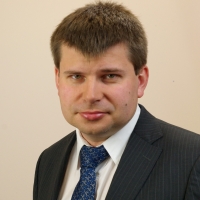
TOMASZ CHOMICKI
Senior Business Development Manager, manager for business development in Samsung Electronics Polska. Graduate of the University of Science and Technology in Bydgoszcz, the George Washington University – School of Business, and specialist courses at the London Business School. He began his professional career in the Lucent Technologies Poland as an engineer, then the project coordinator. Between 2002 and 2008, he was an employee of the IT company Telekomunikacja Polska SA – Orange, and co-founded the Department of Sale Projects, serving as the projects’ manager. Next six years, he executed managerial and sales posts in IBM Polska. For four years now, he has been employed in Samsung Electronics Polska. He is responsible for business development and creating new strategic business solutions, including the creation of innovative projects with the public administration. He is the coordinator of the Samsung Electronics Polska – SGH Warsaw School of Economics programme.
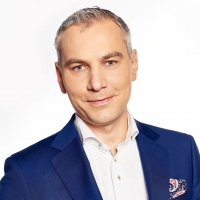
DAWID WRONA
Sales Department Manager and the Manager of the Customer of the housing sector in the Echo Investment. He has a 15- year long experience in all segments of the housing market. Earlier, he had cooperated with, inter alia, Dom Development S.A., Marvipol S.A., and the leading developer in Romania - Impact Developer & Contractor. He is responsible for sales, marketing and customer service, realising the adopted policy of the company in the area of sales and activities aimed at providing the highest quality customer service. He is the head of all housing projects of the Echo Investment Company in Poland.
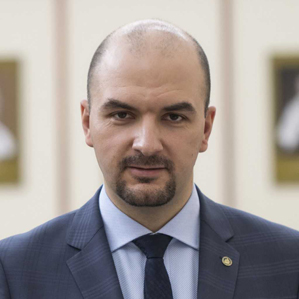
KRZYSZTOF KOZŁOWSKI
The SGH professor, PH. D., the SGH Vice Chancellor for Teaching and Student Affairs. Graduate of the Faculty of Journalism and Political Science at the University of Warsaw (2002) and the Faculty of Law and Administration at the University of Warsaw (2006). He obtained doctor’s degree at the Institute of Political Science of the University of Warsaw (2008), habilitation at the Department of Political Science and Journalism of the Adam Mickiewicz University in Poznań (2012). In 2017, 2018 and 2019, he was elected the Inspiration of the Year by the SGH bachelor degree students. He is interested in political changes in the Eastern and Central Asia, with particular focus on the Korean Peninsula, People’s Republic of China and Taiwan.

